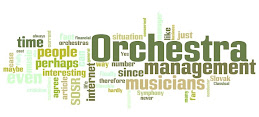My daughter would call it "a bad hair day"; when daddy is not in the mood, manages to create a bit of stupendous chaos, or says something which is utterly inappropriate and then wants to crawl in the deepest pit. Happens to all of us. As musicians we are, after all, still human. But what I read in the papers, would - in case I would be quoted these opinions - cause me to jump of the highest building in town. Perhaps I was born on a wrong planet, perhaps in a wrong century, but if my memeory serves me right, when we used to study music, or for that matter whatever we did, we tried to keep an eye on quality. Or else...
It was a few days ago in the SME newspaper - culture section, where the Slovak violinist Juraj Čižmarovič gave an interview. (For those able to read Slovak you can find the article here.) Just for your information, Mr Čižmarovič is currently concert master with the Cologne based WDR Fernsehenorchester and is lately taking up the conductor's baton as well. Quite an achievement. Chapeau.
While elaborating on the usual stuff like his youth, parents, studies and achievements, he places a remark, which made my hair raise as if electrocuted with 20 thousand Volts - the least. He was asked on the question of quality (in music). The conclusion was, that quality is determined by consensus and therefore, when (the majority) of the audience like a piece it is therefore quality.
Now that is an interesting statement, when taken out of context might be interpreted a bit, .. well wrongly. I re-read that paragraph a few times; the exact questions, the immediate answers (the journalist seemed surprised as well, and reiterated his question to clarify whether he understood Čižmarovič correctly), and cannot conclude that he meant it that way.
Some time ago, the very same Mr. Čižmarovič came to Bratislava, to perform Vivaldi's Four Seasons. It was a kind of a weak rendition of "Mr. So-and-so and Friends", where - in all honestly - the professionality of Mr Čižmarovič was at stake. The playing was not only outdated (over vibrated, acrobatic show off instead of refined music due to the piece), it was out of tune, full of mistakes, where even a tone-deaf listener would notice mistakes, for the Four Seasons are almost known to everyone.
But putting these two things - the embarrassing performance and the interview - together, gave me suddenly an insight what Mr. Čižmarovič is all about: playing lousy music - but as long as the audience loves it - is quality to you. Perhaps the artist shoudl have a sense to feel responsible to deliver quality to the audience, also to educate the audience to become more appreciative to quality... or am I too naive?
Well, in that case there's little hope for Slovakia's audience. You get medicority as a standard of quality. Even the professional musician seems no longer to be interested in true musical quality. Unbelievable. Perhaps I am having a bad hair-day.
MS

